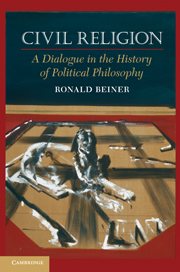Book contents
- Frontmatter
- Contents
- Preface and Acknowledgments
- Introduction
- Part I Machiavelli, Hobbes, Rousseau
- Part II Responses to (and Partial Incorporations of) Civil Religion within the Liberal Tradition
- 9 Baruch Spinoza
- 10 Philosophy and Piety
- 11 Spinoza's Interpretation of the Commonwealth of the Hebrews, and Why Civil Religion Is a Continuing Presence in His Version of Liberalism
- 12 John Locke
- 13 “The Gods of the Philosophers” I
- 14 Bayle's Republic of Atheists
- 15 Montesquieu's Pluralized Civil Religion
- 16 The Straussian Rejection of the Enlightenment as Applied to Bayle and Montesquieu
- 17 “The Gods of the Philosophers” II
- 18 Hume as a Successor to Bayle
- 19 Adam Smith's Sequel to Hume (and Hobbes)
- 20 Christianity as a Civil Religion
- 21 John Stuart Mill's Project to Turn Atheism into a Religion
- 22 Mill's Critics
- 23 John Rawls's Genealogy of Liberalism
- 24 Prosaic Liberalism
- Part III Theocratic Responses to Liberalism
- Part IV Postmodern “Theism”
- Conclusion
- Index
- References
15 - Montesquieu's Pluralized Civil Religion
Published online by Cambridge University Press: 05 June 2012
- Frontmatter
- Contents
- Preface and Acknowledgments
- Introduction
- Part I Machiavelli, Hobbes, Rousseau
- Part II Responses to (and Partial Incorporations of) Civil Religion within the Liberal Tradition
- 9 Baruch Spinoza
- 10 Philosophy and Piety
- 11 Spinoza's Interpretation of the Commonwealth of the Hebrews, and Why Civil Religion Is a Continuing Presence in His Version of Liberalism
- 12 John Locke
- 13 “The Gods of the Philosophers” I
- 14 Bayle's Republic of Atheists
- 15 Montesquieu's Pluralized Civil Religion
- 16 The Straussian Rejection of the Enlightenment as Applied to Bayle and Montesquieu
- 17 “The Gods of the Philosophers” II
- 18 Hume as a Successor to Bayle
- 19 Adam Smith's Sequel to Hume (and Hobbes)
- 20 Christianity as a Civil Religion
- 21 John Stuart Mill's Project to Turn Atheism into a Religion
- 22 Mill's Critics
- 23 John Rawls's Genealogy of Liberalism
- 24 Prosaic Liberalism
- Part III Theocratic Responses to Liberalism
- Part IV Postmodern “Theism”
- Conclusion
- Index
- References
Summary
Christianity…did not establish entirely new virtues; but it changed their relative position. Certain rude and half-savage virtues had been on the top of the list; Christianity put them on the bottom. The milder virtues (such as neighborly love, pity, leniency, the forgetfulness even of injuries) had been on the bottom of the antique list; Christianity placed them above all others.
– Alexis de TocquevilleMontesquieu begins Book 29 of The Spirit of the Laws with the claim that his book's purpose is to prove that the legislator must embody the spirit of moderation: Political good, he says, is always to be located between two extremes. This Aristotelian idea of virtue as a mean between extremes points us back to the beginning of Book 25, where Montesquieu highlights two extremes in the experience of religion: piety and atheism. Applying the Montesquieuian rule yields the notion that the legislator should aim at splitting the difference between piety and atheism. Piety is defined here as love of religion; atheism is defined as fear of religion. The wise legislator should neither love nor fear religion but should be guided by a third principle, namely the possible utility of religion. Or rather, attending to the utility of religion should combine an appreciation of the advantages that can come with a loving respect for a particular religion established within a given society, with fear of the evils that can arise from the reign of religion at its worst. The prudent legislator is concerned with how to use both the pious man's love for religion and the atheist's fear of religion to secure good political purposes. However, it goes without saying that someone who can think about religion both from the pious person's perspective (surveying the goods of religion) and the atheist's perspective (surveying the evils of religion) can truly inhabit neither perspective, neither that of atheism nor that of piety.
Given how the Rousseauian interpretation of civil religion functions as a hub for the whole of this book, one can hardly avoid relating Montesquieu to the corresponding views in Rousseau. Let us recall the interpretation presented in Part I. The standard reading of Social Contract IV.8 is that Rousseau gives consummate expression to his illiberal politics by ending the book with the highly illiberal project of positing a state religion. Rousseau seems to point in this illiberal direction by radically contrasting the antipolitical character of modern Christianity with the politicizing function of ancient paganism. This, however, is a false impression: Although Rousseau does his utmost to highlight the political deficiencies of Christianity by playing up the civic character of paganism, he ultimately rejects the latter, saying that the “religion of the citizen” leads eventually to cruel intolerance and theocratic imperialism. The “civil religion” that Rousseau lays out at the end of the chapter falls well short of civic religion on the Roman model: Rousseau insists that “there is no longer and can never again be an exclusive national religion.” Rather, Rousseau, no less than Locke, places tolerance at the center of his teaching on the relation between church and state. I do not think it would be an overstatement to say that Rousseau concludes a supposedly antiliberal theory of politics with a celebration of liberalism.
- Type
- Chapter
- Information
- Civil ReligionA Dialogue in the History of Political Philosophy, pp. 189 - 198Publisher: Cambridge University PressPrint publication year: 2010



